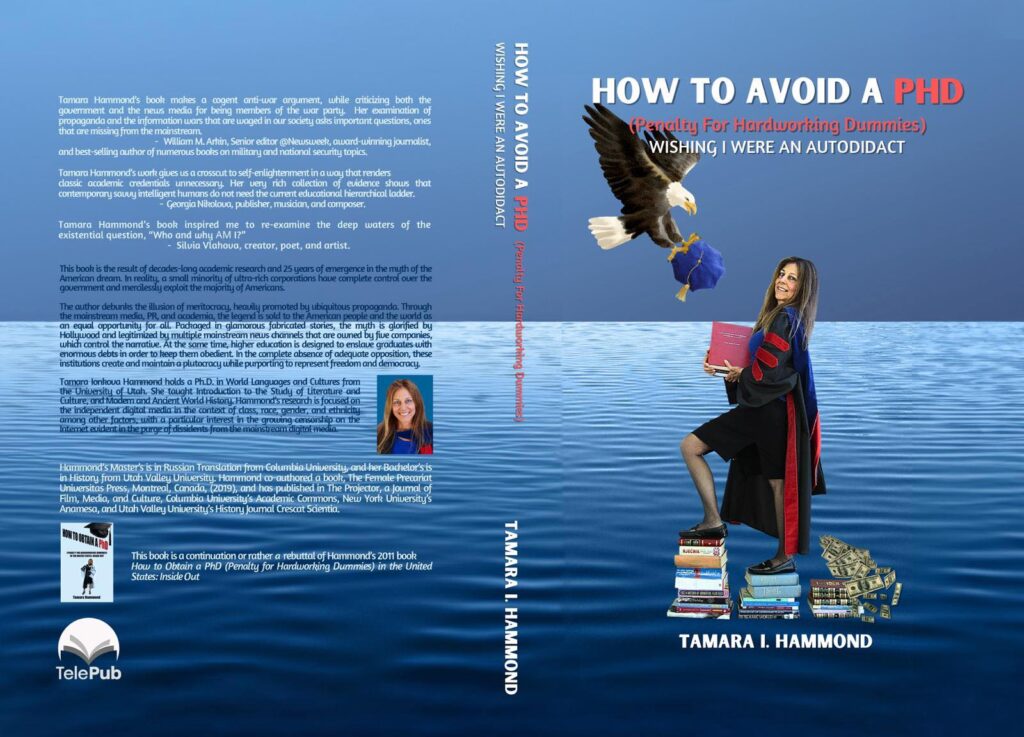To All Who Will Say, “It Has Nothing to Do with Me”
This book is a profound research work that exposes corruption, censorship, and corporate tyranny in the purported democratic system of the US. Hammond reveals the subversive role of the mainstream media in deceiving the public and manufacturing consent for perpetual wars, individual responsibility for institutional failures, and social injustice presented as a meritocracy. At the same time, argues Hammond, the incessant propaganda conditions the public to accept the denial of basic human rights such as healthcare, living wages, and higher education as undeserved luxuries.

According to the author, through sophisticated mechanisms, the People Relations industry constantly disseminates the illusion of freedom and democracy and inculcates the myth. Hammond offers a brief history of media corruption through consolidation of ownership, currently reduced to five giant corporations. The author opens the first chapter with a short analysis of the classic 5 filters of mass media detailed in Herman and Chomsky’s 1988 Manufacturing Consent. Although Chomsky’s revelation is widely popular as every dissident’s bible, less known is that the authors dedicated the book to an Australian writer, Alex Carey, whom they consider a pioneer in the field of propaganda.
According to Carey, people in the US have been subjected to an unparalleled, extensive, three-quarters century-long propaganda effort, designed to expand corporate rights by undermining democracy. Hammond traces the roots of propaganda back to the 1920s, when the founder of the People Relations field, Edward Bernays, initiated his mass psychological campaigns to win public opinion. Bernay’s successes include influencing women to smoke and promoting foreign intervention in Latin American countries at the behest of corporations, later known as Banana Republics.

During that time, leading intellectuals such as Bernays and Walter Lippmann freely used the term “propaganda” as an indoctrination tool and promulgated the idea of manipulating the public.
Bernay’s 1928 book titled Propaganda, was a literal manual for the ruling intelligentsia. According to Bernays, the masses should be unaware of the source of their influencers, while the audience is overwhelmed with carefully selected images and rhetoric by unknown agents. Another source used by Hammond is George Orwell’s unpublished preface titled “The Freedom of the Press” to his 1945 Animal Farm. A curious little-known fact is that Orwell had a hard time publishing the book in democratic Britain, and took him five years to find a publisher. Moreover, the preface, in which he explains the phenomenon of self-censorship and how in Western democracies it is done in a very subtle way in contrast with dictatorships where the censoring is open. Perhaps because of this analogy, the preface is still not published within the book, although could be found separately on the Internet.
Tamara Hammond’s book extensively analyzes the current media status with emphasis on alternative media in the context of the rising censorship practiced by the owners of social media networks. According to the author, from Google to Facebook to X (nee Twitter) tne giant networks are obedient purveyors of the ruling oligarchy that transcends national borders. Hammond warns that we are being conditioned to accept a neo-feudal technocratic dictatorship based on fearmongering and deception. Much of the book is dedicated to educating the audience about the real dissidents in media and academia who fight against wars and corruption, and to liberate imprisoned journalists like Julian Assange.
The epilogue features an allegorical tale about the slippery slope of corruption and the mechanisms of power that overwhelm even the most noble minds. Available for order on Amazon.
